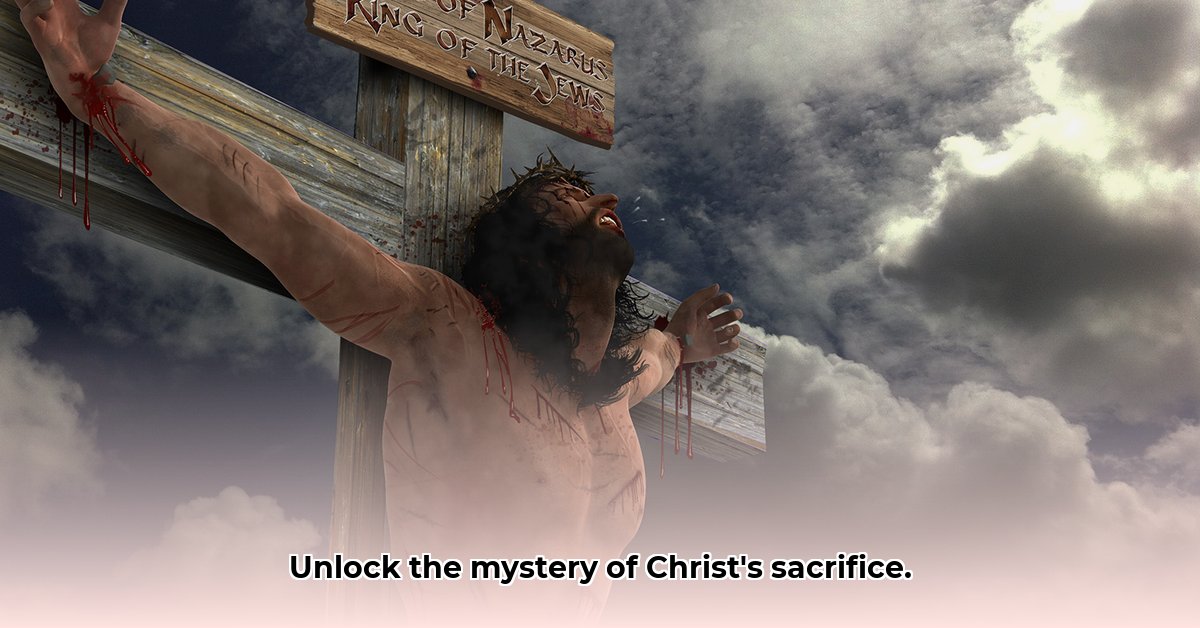
Christ's Sacrifice: A Cornerstone of Christian Faith
The death of Jesus Christ forms the bedrock of Christian belief. But what does it truly signify? This enduring question has spurred centuries of contemplation and continues to inspire theological debate. This guide offers a clear and accessible exploration of this profound event, examining various interpretations within a respectful and scholarly context. We'll delve into the historical context, explore different theological perspectives, and consider the implications for believers today. For a different perspective, see God's death.
The Weight of Human Failing
Humans err. Sometimes these mistakes are minor; other times, they carry significant consequences. In Christian theology, these failings are categorized as "sin," creating a spiritual separation from a perfect God. This separation is not merely a feeling but, according to Christian belief, a spiritual reality. The concept of sacrifice—giving something precious to rectify a wrong—is deeply ingrained in human history. Across cultures, sacrifices—from animals to humans—were offered to appease deities. However, the Christian understanding of sacrifice is profoundly different, representing a radical shift in perspective.
Old Testament Foreshadowing: Hints of the Ultimate Sacrifice
The Old Testament, predating Christianity, contains numerous accounts of sacrifice. Animals were regularly offered to atone for sins and seek divine favor. The Passover lamb, for example, where Israelites marked their doorposts with its blood to avoid a deadly plague, serves as a potent example. Many Christians interpret these rituals not as standalone events, but as symbolic prefigurations of Jesus’ ultimate sacrifice. While these earlier sacrifices provided temporary atonement, they arguably hinted at a deeper, more complete solution to humanity's spiritual dilemma. They foreshadowed, in a sense, the transformative power yet to come.
Jesus: The Ultimate Offering and the Lamb of God
Christians believe that Jesus, referred to as the "Lamb of God," was the ultimate fulfillment of these earlier sacrifices. While completely innocent, he willingly surrendered his life. His death is not viewed as deserved punishment but instead as a selfless act of love, a radical demonstration of God's desire to reconcile with humanity. Christian theology posits that He absorbed the weight of human wrongdoing, enabling potential reconciliation. This is a complex concept, yet undeniably powerful and moving in its implications.
Diverse Interpretations of Jesus' Sacrifice
The meaning of Jesus' sacrifice is interpreted diversely within Christianity, lacking a single, universally accepted explanation. Here are some key perspectives:
Penal Substitution: This view posits that Jesus bore the punishment deserved for humanity's sins, acting as a substitute who paid the penalty in our place. This is often understood as a legal transaction, satisfying justice and upholding God's holiness.
Christus Victor: This perspective highlights Jesus' triumph over evil—sin, death, and the devil—through his death and resurrection. Jesus didn't merely atone; He conquered the powers that held humanity captive.
Moral Influence: This approach focuses on the transformative power of Jesus' love and self-sacrifice, inspiring individuals to change their lives, turning away from sin, and emulating God's example.
These interpretations aren't mutually exclusive; some Christians integrate elements from each, highlighting different facets of the same profound event. Central to all, however, are the themes of love, forgiveness, and redemption.
The Resurrection: Validation of the Sacrifice
Jesus' resurrection is not an afterthought; it's pivotal to the narrative. Christians believe it's the ultimate confirmation of his sacrifice's effectiveness. His rising from the dead validates his victory over sin and death, offering hope, new life, and the ultimate triumph of forgiveness. The empty tomb embodies this promise of a transformative future.
The Significance for Believers Today
Understanding Christ's sacrifice profoundly impacts the lives of Christians, offering:
- Forgiveness: Release from guilt and shame.
- Reconciliation: Restoration of a relationship with God.
- Eternal Life: A life beyond earthly existence.
It also compels believers to act—to reject harmful behaviors, embrace God's love, and live lives that reflect that love.
Key Concepts: A Summary
| Concept | Explanation |
|---|---|
| Atonement | Making amends for wrongdoings; restoring a right relationship with God. |
| Reconciliation | The restoration of a broken relationship, particularly with God. |
| Substitution | Jesus taking the punishment that we deserved for our sins. |
| Redemption | Being rescued or set free from the consequences of sin. |
| Salvation | Being saved from the penalty and power of sin; receiving eternal life and God's grace. |
Understanding Christ's sacrifice is an ongoing journey, demanding reflection, study, and prayer. It’s a complex and intensely personal matter that continues to evoke wonder and debate, making it a perpetually compelling subject of contemplation. This exploration offers a framework for deeper understanding, yet leaves room for personal interpretation and spiritual growth.